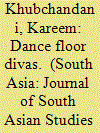| Srl | Item |
| 1 |
ID:
171298


|
|
|
|
|
| Summary/Abstract |
Tracing his encounters with one particular song during fieldwork on queer nightlife in Bangalore, the author argues for the usefulness of ethnography as a critical method for studying dance and other modes of fun, play and pleasure in South Asia. He argues that ethnography’s many modes (co-performance, interview, observation, auto-ethnography) evidence how expressive practices integrate into the multiple strata of everyday life and political-economy, and how these cultural expressions facilitate inventions of new selves and worlds. While popular, improvised and social dances are challenging to study given their ephemerality, ethnography deepens our understanding of them and allows us to engage in creative dialogue in fieldwork.
|
|
|
|
|
|
|
|
|
|
|
|
|
|
|
|
| 2 |
ID:
191703


|
|
|
|
|
| Summary/Abstract |
In February 2016, Union Minister Smriti Irani delivered a torrential speech in India’s Lok Sabha, in which she refuted the need for an apology from her government for the death of Rohith Vemula (a Dalit student at Hyderabad University) or for the arrests and aggravation at Jawaharlal Nehru University in New Delhi, where students had been arrested under specious accusations of sedition. Her melodramatic delivery and grand gestures recalled the theatricality of her soap operatic past as the protagonist of the hit series, ‘Kyunki Saas Bhi Kabhi Bahu Thi’. The morning after this speech, The Telegraph newspaper printed coverage of Irani’s diatribe with an image of her staring widely at the reader; the headline read ‘Aunty National’. As wordplay on anti-national, the moniker marked as harmful to the nation Irani’s alignment with Hindutva politics and her lack of culpability for the violence done to Dalit and Muslim students. This was a particularly pointed move as JNU students were simultaneously being accused of sedition, of being anti-national. The use of ‘aunty’ amplified disdain for Irani by tapping into the fatphobia, sexism and ageism that is often wielded against older South Asian women; it was meant to sting.
|
|
|
|
|
|
|
|
|
|
|
|
|
|
|
|